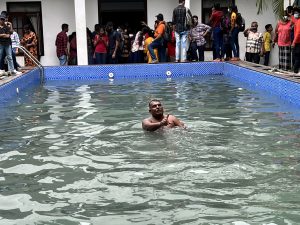COLOMBO — Shortly after protestors stormed the Sri Lankan presidential palace, prompting the resignations of President Gotabaya Rajapaksa and Prime Minister Ranil Wickremesinghe, a unity government comprising of all political parties was announced.
It’s not yet formed but the first job of the new government will be to count the costs of a debt legacy that has crippled the economy and pushed millions into poverty through hyper-inflation that resulted in food and medical shortages, described by doctors as a “death sentence,” and virtually no fuel.
Sri Lanka’s numbers are incredulous. Its debt totals $51 billion. Japan is its largest lender, followed by the Asian Development Bank (ADB). China, often accused of luring the island nation into a debt trap, is third, accounting for about 10 percent of the total.
Sri Lanka needs $7 billion to meet its debt obligations to function for the rest of this year but foreign reserves total $1.7 billion and the central bank says of that just $25 million is “usable.” It admits that a request for help from the International Monetary Fund (IMF) was sent too late.
Lending rates are above 15 percent and the inflation rate for July is expected to hit 60 percent amid allegations of cronyism and gross corruption by Rajapaksa, whose family had controlled the country for much of the past 17 years.
Sri Lanka’s inability to meet debt repayments last week resulted in a bankruptcy declaration, but international banks had already stopped accepting Letters of Credit from the country’s state-run companies, including the Ceylonese Petroleum Corporation (CPC).
The CPC buys and imports the nation’s fuel. Seven oil suppliers are owed $800 million and the next oil shipment is not due until July 22 after farcical attempts to find alternative sources failed.
The lack of petrol resulted in a million protestors marching through the capital, demanding Rajapaksa’s resignation. They got that after some took a swim in the president’s pool, while others burned the prime minister’s home to a cinder.
But the idea that Rajapaksa could ask for $6 billion from the IMF – controlled by the United States, Europe, and Japan – as he did last week, to cover financial obligations over the next five months and to fund cheap oil purchases from Russian President Vladimir Putin, was borderline idiocy.
Technically, this can be done. Sanctions imposed over Moscow’s invasion of Ukraine can be avoided if the oil is acquired through a third party but the IMF would take a dim view, and with zero credit the only option to fund such a deal would be through some kind of barter arrangement.
Therein lies another problem. Sri Lanka has little to trade, particularly given this year’s dismal rice crop, something that was also caused by another Rajapaksa order.
Farmers were told to abandon fertilizers and grow their crops organically, a trumped-up holistic answer to the country’s fiscal inability to import urea that fooled no one and drove rice prices even higher.
Put simply, Sri Lanka needs an underwriter, a debt restructuring, and a refinancing package capable of ensuring this country’s basic needs – food and energy security, health, and education – are met.
A full and proper investigation into allegations that billions of dollars had been misappropriated by Rajapaksa and his family, headed by the dynastic-minded Mahinda, would also be appropriate.
The IMF is the only institution capable of delivering on all fronts and it’s a task which will cost 22 million Sri Lankans their economic sovereignty, at least for several years to come, and require the support of all major lenders.
China had sought to promote its own global agenda through Sri Lanka’s strategic position among the sea lanes of communication by lending when it should not have. But it has indicated it will play “a positive role” in a restructuring of its debts. So has Japan and the ADB.
Help cannot come soon enough, especially for the likes of Asmy, a 42-year-old tuk-tuk driver who had been sleeping rough for four nights in a Colombo fuel line, one of hundreds that stretched back two to three kilometers.
Flanked by his peers he said, “We cannot wait any longer. We have no food, no petrol, my family, my child, my wife are hungry. There is no money and it is very, very hard on the old.”

































